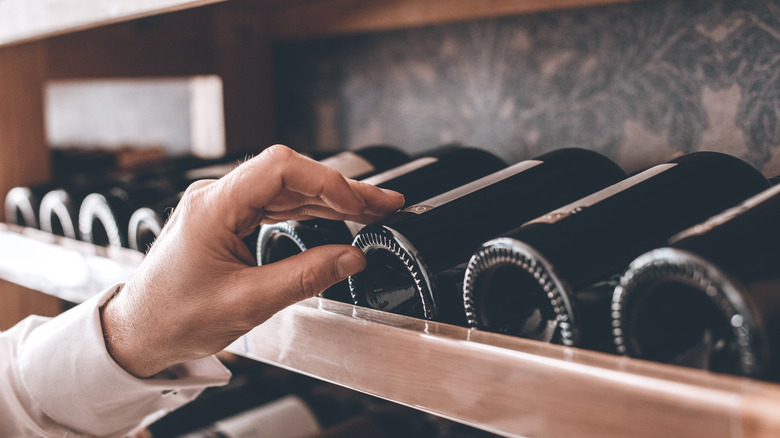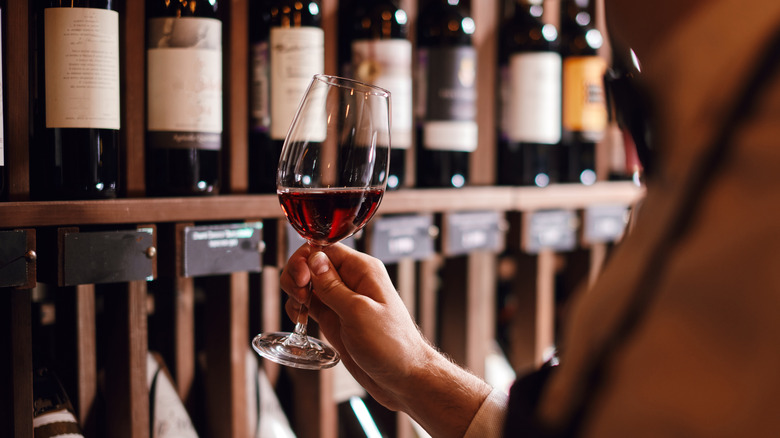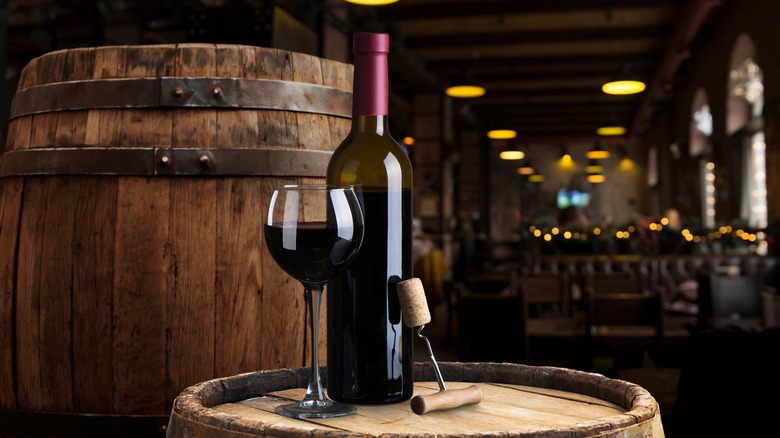The Scientific Reason Aged Wines Often Taste Better
Here's the hard truth: Wine is complicated. There's a lot more to know than just differentiating between red and white. Winemaking is a blend of both science and art, with dozens of decisions being made in the vineyard, throughout harvest, and during fermentation and barreling that will affect how the wine tastes, smells, and ages.
Several wine varietals have the natural acidity and tannins for aging, while others should not be held in your cellar longer than a year or two (via Autry Cellars). Few people buy themselves a bottle of wine with the intention of saving it to age five to 10 years. Of course, winemakers know about their customer's impatience, which is why, according to ScienceABC, it is estimated that 90% of wines are made to be drunk within one year and all but 1% of wines are made to be drunk within five. Winemakers who do make ageable wine will usually make a small batch for high-tier club members who can afford to wait for the refined taste of aged wine.
It's hard out there for wine producers who rely on time to prove the quality of their wine, but honestly, it's worth the wait. Wines that are made to age taste significantly better after a few years left to rest in the bottle.
Chemical reactions
Made-to-age wines are a balancing act of four major characteristics: tannin, acid, sugar, and alcohol. Any of these variables' presence will help to preserve wine for a longer period of time. According to Wine Folly, the acidity helps to keep the wine lively, the tannin gives structure to its flavor and color, sugar works as a great preservative (just look at all our favorite jellies and jams), and higher alcohol (found in fortified wines) can be used to preserve as well. Any of these elements in high amounts will aid in aging wine, and when combined will cause a chemical reaction that can affect the taste, color, mouthfeel, and smell of wine (via CellaRaiders).
Wine doesn't stop evolving once it's out of the barrel and in the bottle. Tannins accumulated through contact with the skins, seeds, and stems of the grape combine with other chemical molecules, generating a more complex aroma and flavor in wine, reports Wired. When a wine is young, tannins will give off a bitter and astringent taste and leave your mouth feeling dry. As a wine ages, though, the tannins will soften as they polymerize — or chain together — and taste less aggressive while maintaining a strong structure for the flavor and color of the wine (via Tyrrell's).
Wine will become less tannin-heavy as it ages. The acidity will remain, but become more refined and allow for softer and more elegant elements to shine through. Giving your wine the time to age will ensure that you don't end up with a mouthful of immature, green-tasting, harsh flavors that don't accurately reflect the true quality of the wine.
Bottle aging
Something to note is that different wine varietals age longer than others. Different kinds of grapes will have various levels of natural acidity and tannin which allow us to estimate how long they can be aged (if made well, that is). According to Wine Folly, heavy tannin wines like tempranillo, nebbiolo, and sangiovese should be set aside to age and can be left untouched for up to 25 years because of their strong tannin structure, whereas wines with lower tannin, like the ever-popular pinot noir, will have shorter lifespans.
Every wine has a different lifespan; Vine Pair tells us wine will eventually peak, plateau, and then begin to degrade over time. The key is to aim for when you think your bottle is going to "peak." It takes knowledge, luck, and some guesswork to know how long to age your wine, but learning to master the art will save you from opening a bottle too young or too old.
The longer a wine is left to settle after bottling, the more time is allowed for the tannin, acid, sugar, and alcohol to work together and smooth out the rough, aggressive flavors and textures of the wine, allowing your bottle to bloom into a cohesive drink. You can easily look up the average lifespan of your wine varietal and see how much longer it can age, and how much more time it needs before you should pop it open and indulge.


